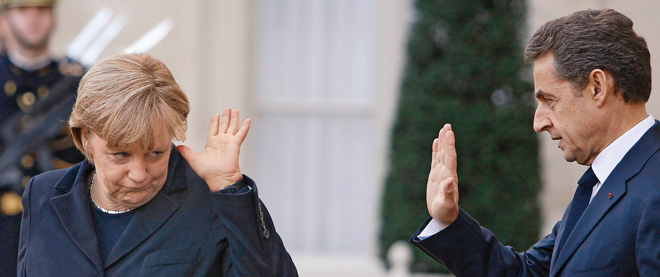How Germany finally took control of Europe
It’s hard to argue anyone else can save the Old Continent
Share

Among the many desperate calls for help during the current European crisis, that of Polish Foreign Minister Radek Sikorski stands out for its sheer lack of precedent. “I may be the first Polish foreign minister in history to say so, but here it is: I fear German power less than I am beginning to fear German inactivity,” Sikorsky said last week in Berlin to his hosts. “You have become Europe’s indispensible nation . . . nobody else can do it.” Only Germany can save Europe now.
It’s hard to argue against Sikorksi’s logic, at least in the short run. Ireland and Portugal have been bailed out at great expense. Investors were forced to take a massive loss on Greek bonds. Now even major European states such as Italy and Spain are teetering on the edge of insolvency. If these governments lose the ability to continue borrowing, the entire continent could be plunged into complete economic collapse, with grim implications for the rest of the world, including Canada.
Throughout this two-year-long crisis, only Germany has retained the financial and moral clout sufficient to save the day, thanks to its low unemployment rate, reasonable debt levels and robust financial sector. (France, for all its bluster, remains a necessary but junior partner in this project.) After decades of backstopping the European experiment by buying bonds and, more recently, providing the bulk of the recent bailout packages, Germany has begun to exert a new sense of authority. In particular, German Chancellor Angela Merkel has been demanding strict new rules over spending in individual countries as the price for continued German intervention.
This week in Paris, Merkel and French President Nicolas Sarkozy agreed to a new rescue plan that will see fiscal discipline directly imposed on European nations via some central authority. The exact number of countries involved and the means of control have yet to be worked out, but it seems clear Germany is now in the driver’s seat. These changes, resisted by France and other countries until now, will produce a much more tightly integrated political and economic federation within Europe, and one designed in Germany’s image.
It’s clearly in everyone’s best interests to prevent a collapse of the European Union, as well as the euro currency. Germany’s insistence on external budgetary controls seems appropriate as well, given the size of the crisis, the demands of the international bond market and the inability of many countries to solve their own problems; not to mention the pleadings of smaller nations such as Poland. And yet fiscal sovereignty is not something to be surrendered lightly.
The European Union was originally conceived, in the wake of the Second World War, with the noble intention of preventing future wars by encouraging greater economic integration. The first functional step toward a trans-border union came in 1951 with the creation of the European Coal and Steel Community. By sharing control over strategic military resources, “war between France and Germany becomes not merely unthinkable, but materially impossible,” French foreign minister Robert Schuman said at the time.
Sixty years of peace is clearly a tremendous achievement. But the European Union has since evolved into something quite different from its original intent—now it’s become an overarching political entity with its own parliament, courts, central bank and common currency, all of which has eroded democratic responsibility in member nations. Surrendering authority over budgeting to a supra-national agency represents a further and substantial loss of national autonomy. Certainly there’s no evidence Germany harbours any intentions beyond the immediate benevolent rescue of Europe, but a permanent transfer of power from individual legislatures to some unelected technocratic authority is hardly desirable in the long run.
To preserve the future of European democracy, whatever new powers are assigned to central authorities must be dismantled as soon as the current crisis passes. To make this certain, a sunset clause should be built into any treaty amendments or new agreements. Further, this entire episode should serve as notice to voters around the world of the dangers of living beyond your means. If you can’t manage your own house, eventually some else will. And no one wants that.